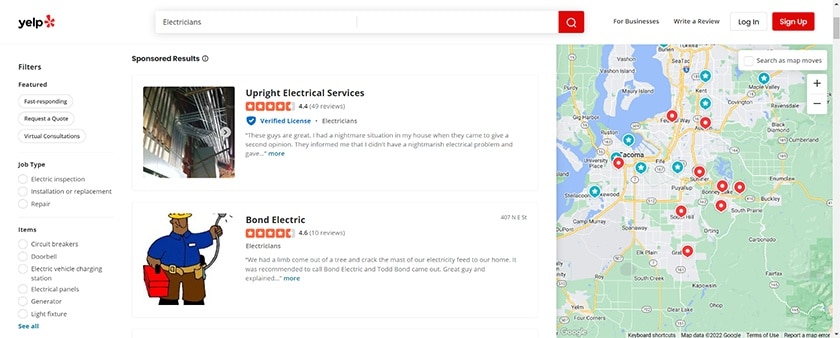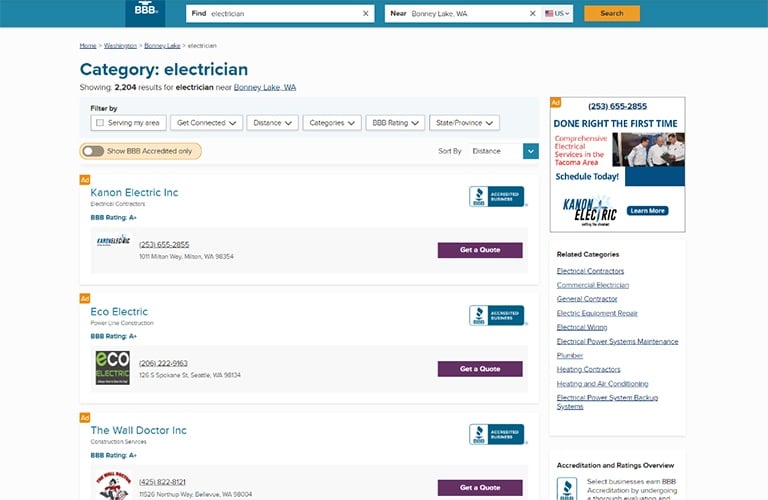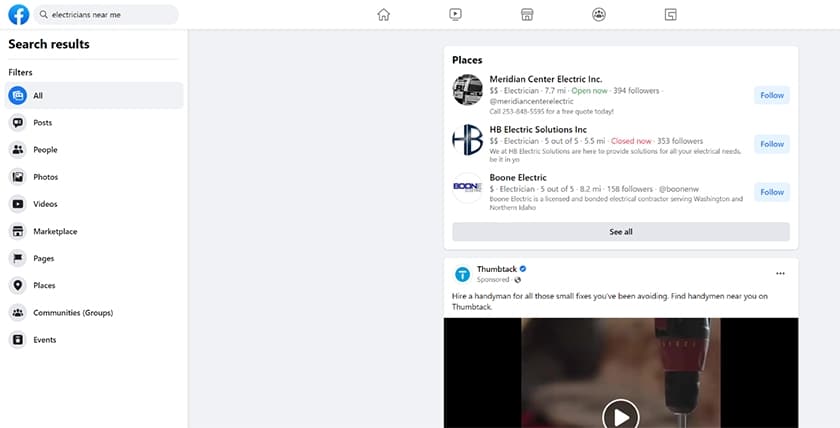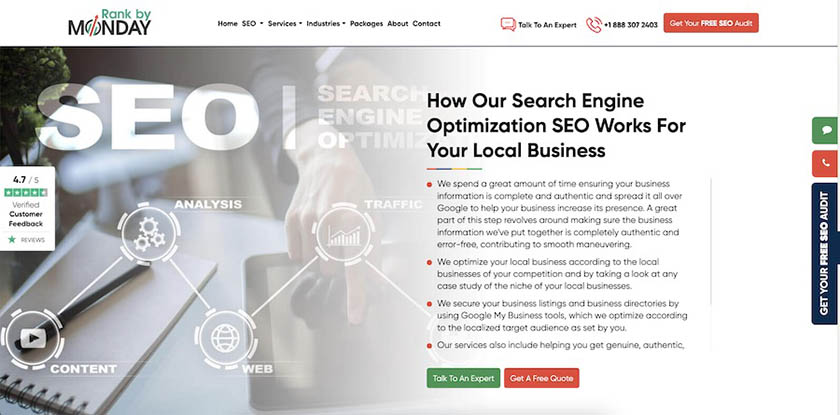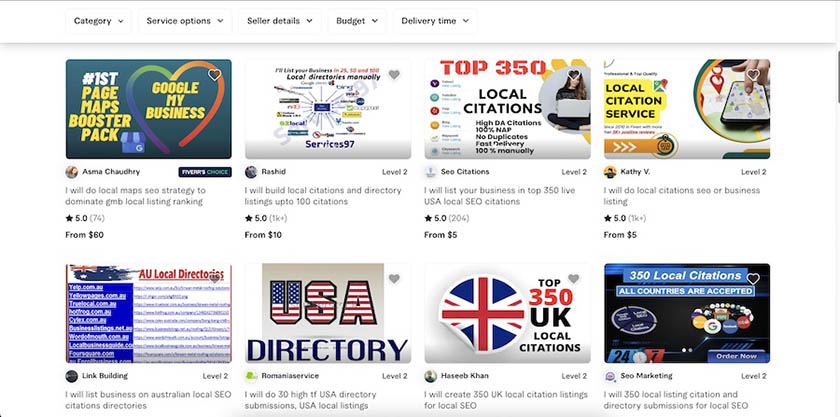Local citations are essential to growing your business’ search engine ranking and overall online presence. Local search engine optimization (SEO) citations are links to your business website spread out across the internet, especially on reputable and widely visited websites like business directories and prominent blogs and media outlets. Local citations grant your business more credibility and visibility. Keep reading to learn how to build local citations for your business in seven ways.
What Are Local Citations?
Local SEO citations are listings and mentions of your business’ details, specifically your business name, address, and phone number (NAP), on other public websites. These mentions increase your business’ search engine ranking and credibility by giving people more entry points into your website and establishing it as a reliable source of information.
You can think of local citations as your business being referenced in another person’s published work. It gives your business a boost in visibility and credibility, which both help build your brand presence.
To get your website mentioned on other sites, you’ll need to put in a little effort. The good news is that there are several ways to do so, all of which are relatively simple. You can create a Google Business Profile for free, get listed on local online directories, or reach out to local bloggers and local media. Keep reading below to learn how to build local citations for your business in seven ways.
1. Create & Optimize Your Google Business Profile
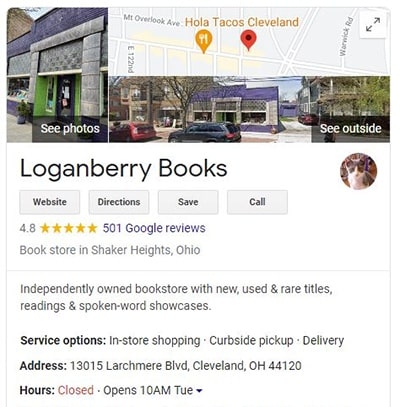
An example of a Google Business Profile with a map for local SEO (Source: Google)
A Google Business Profile is one of the most important places to have your business info (other than your website). After creating your small business website, setting up your Google Business Profile is one of the foremost ways of learning how to build online citations and optimize your online presence. Google Business Profiles are Google’s version of an online business directory, and it’s free for anyone to join.
After creating or claiming your profile, ask customers to leave reviews for your business, then make sure to interact and respond to them, along with any questions they ask. Doing so improves your online visibility since active and engaged profiles tend to rank higher on Google. Learn more in our step-by-step guide on how to create a Google Business Profile.
Once you’ve set up your Google Business Profile, here are more ways to optimize it regularly:
- Include all the relevant information about your business, such as your operating hours, website, and contact information.
- Update your profile at least quarterly with any special events, holiday hours, and any other temporary changes.
- Add high-quality photos and videos and add new images frequently.
- Use location-specific keywords in your profile to help customers find your business.
- Develop a strategy for getting more Google reviews regularly.
- Respond to customer reviews and questions on your profile.
- Take advantage of Google’s features, such as Google Posts, to promote your business and attract customers.
Pro tip: Getting online citations is just one way to boost your rankings in local search results. Read our article explaining what local SEO is and what you can do to improve your rankings on Google and other search engines.
2. List Your Business to Online Directories
It’s free and easy to add (or claim) business listings on online directories. Start by finding the most relevant directories that accept local citation submissions from businesses. For example, if you own a local restaurant, you might list it on Google, Facebook, Yelp, and Tripadvisor. Meanwhile, a home repair service would probably benefit most from listing on Angi.
Focus on the local citation sites and directories that cater specifically to your business type, then follow the instructions to create your listing. It usually only involves filling out a form and then going through a short verification process.
Below are some of the most essential online directories to list your business on:
- Google Business Profile (formerly Google My Business)
- Apple Maps
- Yelp (read our Yelp for business guide)
- Bing Places (see how to use Bing for business)
- Facebook (learn how to create a Facebook business page)
- MapQuest
- Better Business Bureau, or BBB (find out how to become BBB-accredited)
- Foursquare
- Yellow Pages
In addition to these general business directories, there are other industry- or location-specific directories on which you can list your business and get more local SEO citations. As in the example above, a restaurant might focus on Yelp or Zomato, and so on. Find out more in our list of the best online business directories.
Did you know? A study by BrightLocal found that the highest-ranked local businesses had an average of 85 citations. While this data is from 2018, trends in the local SEO landscape all indicate its increased importance in consumers’ purchase decisions, especially since the pandemic. While having this many listings isn’t necessary, the more accurate local citations you have, the better your chances of ranking.
3. Submit & Manage Local SEO Citations Using Aggregators
There are dozens of business directories you can list your website on, and getting through them all would take you hours of time and effort. This is where data aggregators come in. Data aggregators are online platforms that collect and compile data from various sources into a single database, and they offer a more efficient way to learn how to build local citations for your business.
The top three data aggregators in the U.S. are Data Axle (formerly Infogroup), Factual (now part of location-based data provider Foursquare), and Neustar Localeze. It’s free or super affordable to claim or add your business to these sites and manage your business’ profile as things change, all from one platform.
Similar to Google and other business directories, you can search on these sites to find and claim your business listings and modify any incorrect data. If your business isn’t there, you can submit your information, and these sites will automatically send out your listing to search engines, public data sources like libraries, and newer search tools, such as car navigation systems and virtual assistants.
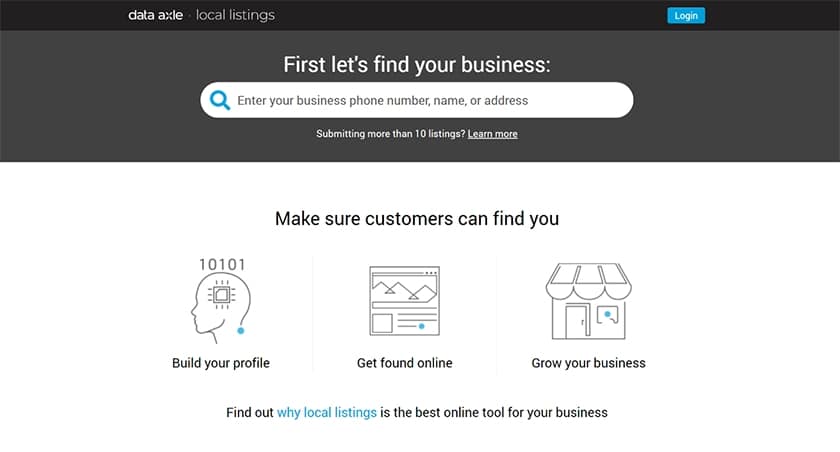
Add and manage your business listing for free on Data Axle. (Source: Data Axle)
Another alternative to learning how to build local citations quickly and easily is using BrightLocal’s data aggregator service. You can submit your business listing to five major data aggregators for $25 each or to all five for $100 per year. This makes it simple to manage your listings in one place, allowing your customers to do business with you easily and ensuring you have hundreds of online citations to help boost your website’s SEO.
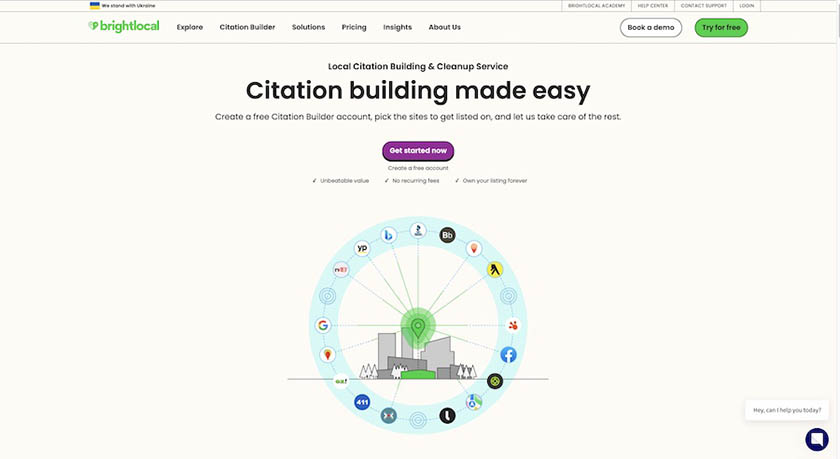
An easy way to build citations for a business is by using BrightLocal’s data aggregator service. (Source: BrightLocal)
Pro tip: If you’re a Semrush user, you can automate local listings by adding Listings Management to any plan for just $20 more monthly. For more self-managed listing tools and resources, read our list of the best local SEO tools for small businesses.
4. Outsource Listing Services From Agencies or Freelancers
If you simply don’t have the bandwidth to manually list your business on all the online directories, you don’t have to do it alone. Another option is to hire professional local citation services to manage your listings for you. There are two ways to do this: you can partner with an agency specializing in local listings or hire a freelance local SEO specialist via platforms like Fiverr.
Most often, hiring services or freelancers will also include other services such as listing monitoring and optimization, link building, competitor analysis, and more. So overall, it’s a good option if you want more comprehensive help from experts and have the extra budget. To help you get started, check out our list of the best local SEO services for small businesses.
5. Reach Out to Bloggers, Journalists & Local Media
Getting local SEO citations in the form of mentions by bloggers, journalists, or media outlets can give a significant boost to your credibility and visibility and make a lasting impression on audiences. This form of influencer marketing can potentially generate website traffic, lead generation, and new customers and sales.
Start by reaching out to bloggers who focus on your industry. For example, if you run a bed and breakfast in Sedona, California, search for travel bloggers who love bed and breakfasts or local bloggers who highlight spots in their neighborhood. Then, reach out to these bloggers and offer them a free night at your hotel so they can experience it, and if they like it, they may write about it.
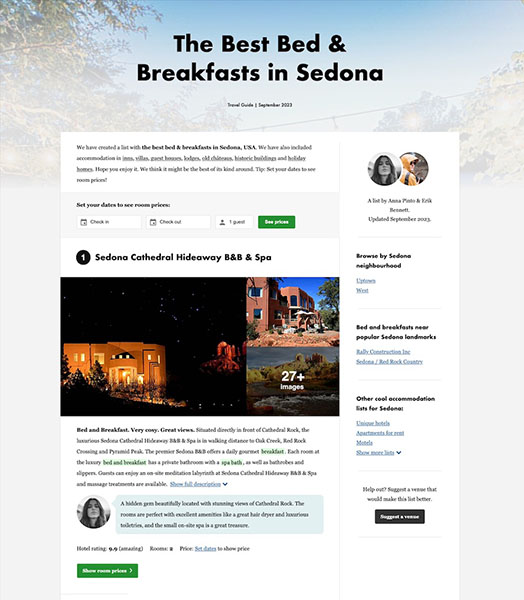
Getting mentioned by local bloggers or media outlets can give your website a significant boost. (Source: bed-and-breakfast.me)
You can also get local business citations by contacting local (or national) media outlets with a newsworthy pitch about your business. If you’re unsure where to pitch a story or worried journalists might ignore your email, you can use a press release service. Some even offer guaranteed placements in certain publications, including high-quality links back to your website and your business NAP.
Pro tip: Influencer marketing is increasingly becoming one of the most cost-effective strategies for small business promotion. Learn more about how to leverage them in our guide to influencer marketing campaigns.
6. Use Online Ads
Using Google or Facebook ads can significantly increase your brand awareness. As a proven search engine marketing (SEM) tactic, digital ad campaigns target your ideal audience and place your brand’s ads into search results, social media feeds, and display ad networks when your target audience is likely to be most interested. You can even buy local citations via Google ads that position your business at the top of the map listings in local search results.
For example, in the image below, Wawa is positioned in the top spot, above the organic local results, because it uses Google local ads. To learn more about how to use Google ads for your business, read our guide to learn how to advertise on Google in a few simple steps.
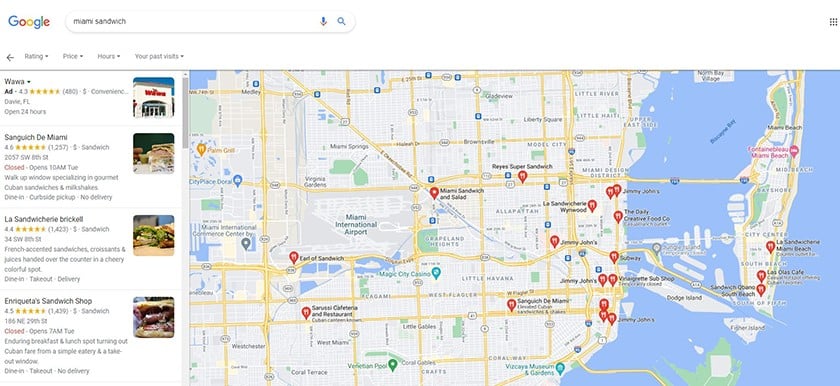
Local citations as displayed in the Google map pack (Source: Google)
7. Get a Citation From Your Local Chamber of Commerce
Local Chambers of Commerce organizations offer memberships to local businesses, which is a low-cost and effective way to build local citations for SEO (membership fees start at $250 yearly). Your listing will be added to the Chamber’s website, giving you exposure and high-quality backlinks. Chamber of Commerce sites are often a go-to for people new in the community, offering a good way to connect with prospects before your competitors do.
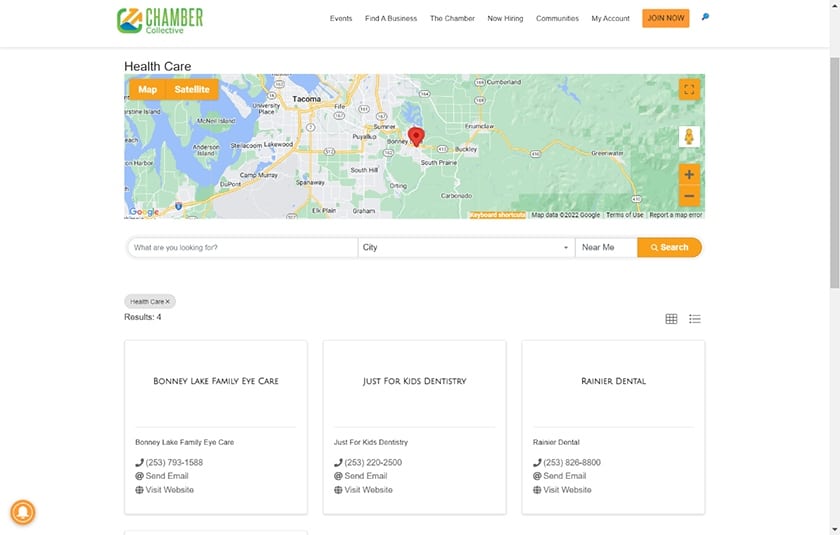
An example of NAP citations via the Chamber of Commerce (Source: The Chamber Collective)
Similarly, many networking groups have local chapters that include the business listings of members. One example of this is Business Network International (BNI). Local chapters limit membership to one business for each type (e.g., only one dental practice per chapter). Additionally, members are encouraged to share recommendations of member businesses on social media, adding yet another way for your business’ NAP to be mentioned online.
Pro tip: Interested in the relationship between business networking and growing your brand presence in the local community? Read our list of business networking statistics to learn more.
Statistics on Local SEO Citations
As local SEO continues to evolve, so do the strategies and tactics that local businesses need to use to rise to the top of the search results. One area that has seen a lot of change in recent years is local SEO citation building since it can help improve your business’ click-through rate (CTR) and overall visibility in search engine results pages (SERPs).
If you’re looking to improve your local SEO, here are some statistics you need to know about citations:
- The average return on investment (ROI) for a local SEO campaign is over 800% after three years. (Source: FirstPageSage)
- Almost all consumers use the internet to research local businesses. A study found that 98% of internet users searched for local businesses online. (Source: BrightLocal)
- More consumers are reading online reviews than ever before. In 2022, 76% of consumers “always” or “regularly” read online reviews when browsing for local businesses. This figure is up from 60% in 2020. (Source: BrightLocal)
- Eighty-eight percent of all reviews come from only four review sites. These four sites are responsible for the distribution of 88% of all online reviews: Google (73%), Yelp (6%), Facebook (3%), and Tripadvisor (3%). (Source: ReviewTrackers)
- Twenty-five percent of a small business’ website traffic comes from local search. This means that one out of every four visits to your website is from someone in your local area. (Source: SEO.ai)
Frequently Asked Questions (FAQs)
Yes—citations are one of the most important ways to build your business’ local SEO. Citations from other sites, such as bloggers’ articles or online business directories, give users more entry points into your website via backlinks and signal that your business is credible. Both of these help increase your website’s ranking on local searches.
One of the easiest and most effective ways to create a local SEO citation is to set up and optimize a Google Business Profile. Some other ways to build local citations are by adding your business listing to online directories such as Yelp or the Yellow Pages, by getting mentioned by bloggers or journalists, by using local online ads such as Google Ads, or by getting a membership for your business from your local Chamber of Commerce.
It’s good to have as many citations as possible to improve your SEO. According to research, the average business in the top three search results has approximately 85 citations. What’s most important is that your citations come from reputable and highly public sources to maximize your visibility and credibility and, therefore, your SEO.
Bottom Line
Local SEO citations are essential to building your business’ online presence. They help your business get discovered online and build its credibility. They’re also relatively simple and can bring in many high returns in the long run. From building your Google Business Profile to becoming a member at your local commerce chamber, follow the tips above to learn how to build local citations for your business and improve your brand presence.
